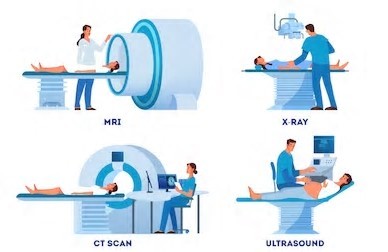The first appointment at the hospital will be with a consultant and this involves obtaining a history of symptoms and general health along with an examination. Further tests will be arranged to obtain more detailed information about the cancer, e.g. scans and biopsies (tissue samples).
Diagnostic tests
There are a number, of diagnostic tests that can be carried out:
- A CT scan - this is a more sophisticated X-ray that takes a 360-degree image of the spine, vertebrae, and internal organs.

Graphics courtesy of Calderdale and Huddersfield NHS Foundation Trust - An MRI, which stands for magnetic resonance imaging and combines a strong magnet with radio waves. The doctor views the images as “slices” or cross-sections of the scanned body part. Unlike x-rays, there is no radiation involved.
- A PET CT (positron emission tomography) scan helps the physician to see the level of activity of certain body organs and tissues, along with their structure. A substance called a “tracer” containing glucose with a little bit of radioactive material. The tracer will be swallowed, inhaled or injected, depending on the examined body part.
- An ultrasound scan of an affected area, for example a neck lump may be offered, and a biopsy may be taken at the same time.
- A nasendoscopy which involves a thin, flexible tube with a light at the end that is passed into the nose and into the throat.
- Fluoroscopy is an imaging technique used to visualise internal organs in the body whilst they are in motion using x-rays.
- A biopsy when a doctor takes a sample of cells or tissue from the lump or area that looks abnormal.
- An examination under general anaesthetic which will involve a thin tube is passed down the throat to examine it and take a biopsy.
Multidisciplinary team
Once all tests are complete, the results are discussed at a meeting called the Multidisciplinary team (MDT) meeting, where a large team of health care professionals meet to review the tests and discuss the best treatment options.
The team may include:
- Consultant maxillofacial surgeons, ENT surgeons, or plastic surgeons all qualified in cancer care
- Specialist Nurses trained in cancer care (key worker)
- Oncologist (Specialist cancer doctors)
- Specialist Speech and Language Therapist (professionals who are trained to assess and educate about swallowing and speech)
- Pathologists (professionals who analyse the tissue samples)
- Radiologists (X-ray and scan experts)
- Hygienist
- Dietitian
- Restorative Dentist (assesses your teeth before, and helps to restore your mouth after, treatment in order to promote mouth function and appearance)
- Anaplastologists (professionals who make prostheses to help rehabilitation of both function and appearance)
Diagnosis
When a diagnosis of cancer is given, the Cancer Nurse Specialist (CNS) will be present.
It is their role to provide practical and emotional support to patients. The CNS supports individual patient needs, through regularly assessing how patients are and reviewing and adapting individual care plans to ensure they meet wider needs e.g. linking to employment advice, local support groups etc. as well as being the link between clinicians and other health professionals.
The CNS will support patients throughout treatment and on completion of treatment ensure that an end of treatment summary is provided. The end of treatment summary outlines the diagnosis, treatment that has been given, possible late effects, actions for the GP and on-going management.
Treatment
Treatment for head and neck cancer can be surgical or non-surgical (radiotherapy, chemotherapy, immunotherapy) or a combination of both surgical and non-surgical treatment.
The consultant will advise a patient on the choices available.

